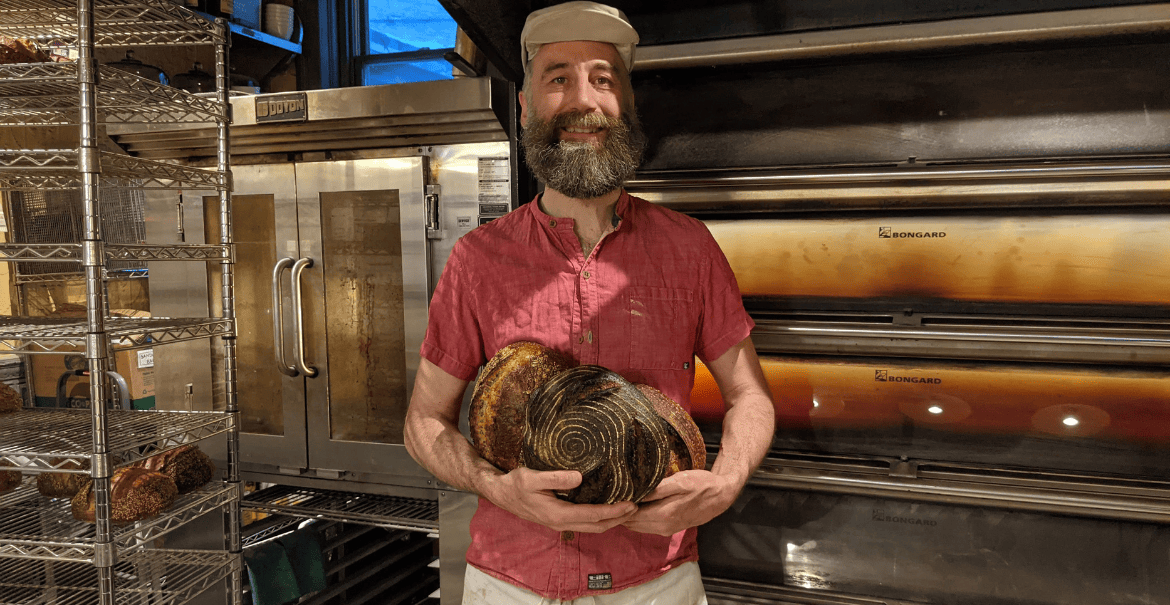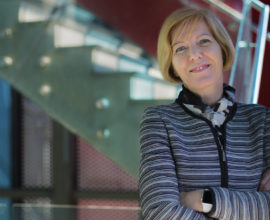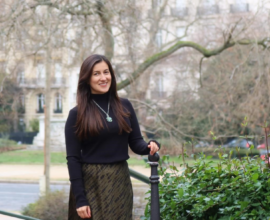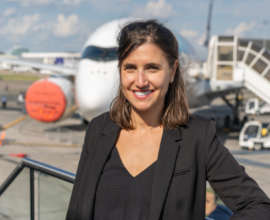Emmanuel ‘Gus’ Reckel
Itinerary of a banker turned baker
![]() Reading Time: 7 minutes
Reading Time: 7 minutes
Owner & Baker L’Imprimerie
As Emmanuel, he graduated from Audencia’s Grande Ecole Master in Management programme and pursued a career in investment banking. As Gus, he learned to bake at the French Culinary Institute before opening his own bakery, L’Imprimerie, in Brooklyn, New York. If you can’t make it to the Big Apple, check out his Instagram account here: https://www.instagram.com/limprimerie/
L’Imprimerie (The Print Shop) is the name of his bakery nestled in the heart of Bushwick, on the edge of Brooklyn. Gus makes the best pain au chocolat in New York, but he’s not after trophies or fame: Gus has a taste for a job well done. Period!
The class of ’97 may remember a certain Emmanuel Reckel, what happened to him?
He stayed in the City. When you reinvent yourself, sometimes you have to go all the way and slough off your old identity.
What happened on that Monday in September 2008?
That Monday in September 2008? I don’t remember really, it’s become blurred over time. It was a long time ago, but, at the same time, it feels like it was yesterday.
I was the Sales Director of a London-based trading room. I remember going away for the weekend like all my colleagues, and reassuring my clients before I left, telling them that everything would be fine, that there was nothing to worry about. That the management had a plan, of course, and that they would reveal it to us very soon. That we would come back stronger than ever, certainly with a new name.
I think everyone at Lehman Brothers spent that weekend glued to their screens, whether it was the news channels or their Blackberries – yes, we hipsters weren’t yet hooked on iPhones. We were waiting for a message from top management, a reassuring word, a hint of what was to come. Monday arrived and we still didn’t have any news. When we got to the office, they asked us to be gone by noon, taking our personal belongings with but leaving our jobs behind. That was it. Lehman had collapsed.
Is that when you changed jobs?
No. I continued in finance, at Nomura Securities, the Japanese brokerage firm that took over part of Lehman Brothers’ activities in Europe. I stayed in London until I was offered a a two-year expatriate contract as Sales Director in New York.
I went for it and I loved New York. Immediately. I felt like I belonged there. When my contract came to an end and I should have been heading back to London, I didn’t want to leave. I don’t like going back: you rarely find what you’re looking for.
OK, but the route from trader to baker isn’t a direct one…
No.
Well, the first step is still an investment. In my mind, I was thinking of a café, a grocery shop, a place to gather in my neighbourhood. I was looking to buy a building because I didn’t want to be dependent on a volatile real estate market or a landlord who could grant or deny my business its breath of life.
When I discovered this place, a 50-year old printing house with a press that was still in working order, I borrowed the money and went for it. But really, at the beginning it was mainly a café project: I wanted to make bread on the side, rather than buying it from a baker and selling it on.

So what made you decide to become a baker?
It was a personal and professional business strategy as well as the lack of market supply. A combination of all of these, I think.
First, I’ve always been an early riser, so you could say I’m predisposed to baking. However, it was mainly when I realised how good bread was so hard to find in New York that I thought about training and going for it.
I wanted to do the Compagnons du Devoir but I was too old. So I looked at the French Culinary Institute in New York. They have a big programme for pastry and another for cooking. They also have a less well-known bread programme, which is very hands-on and in line with my needs and expectations. Above all, it was intensive: in ten weeks, you learn all about French baking techniques, bread but also viennoiseries and everything that uses leavened dough.
That’s all I use today at L’Imprimerie. We’re very transparent with our customers: we have this very authentic side that ties in well with my French origins, the tastes that I loved when I was a kid and that I share today, so yes, we’re the French Bakery of the neighbourhood and we offer what our customers expect to find in a French bakery.
However, since we’re in New York, we’re free to introduce a few little twists because we have a wide community that goes beyond our French customers. We do chocolate with jalapenos, cinnamon rolls with croissant dough. You could say we have something of a Dolly Parton aesthetic: a bit cheap, but very, very authentic.
Is artisanship in your DNA?
Being a baker is probably more important to me than being French, even if I am what I am. I can handle that and I play on my origins, that’s for sure. Nevertheless, what interests me is to be true and honest and make my business work.
We have a quality approach: each morning, everything is freshly prepared by us and cooked on the spot. I don’t see the point of making a strawberry tart out of season just to make our offer more French. This is not our promise.
I offer a different vision of food in my neighbourhood, this idea of slow food and high quality. But also a presence and a place to live in the heart of the community. I’m neither a co-op nor a neighbourhood association, but during COVID-19, for example, we were there every day and for many people we were a landmark.
Our customers are hipsters, Bobos, guys who work in the City, but also people of more modest means, who work at the hospital just down the street. The idea of quality food should not be the reserve of just a few. I’m trying to develop a business that is sustainable, i.e., economically viable, but that fits in well with its community. I pay my staff on time and my suppliers too. But make no mistake, we work hard, we don’t bunk off.

Being a baker is a tough job in a difficult context
Yes, it’s clearly a difficult job.
During the pandemic, a lot of people started making bread at home. And that’s great because it did them a lot of good, especially for their wellbeing. The kneading itself is quite a meditative experience and then there’s the smell of the dough, the contact, the texture. Frankly, bringing a loaf of bread to life is an incredible sensation.
However, there is a huge difference between fantasising about changing jobs while you’re making your bread at home and actually doing it. The reality of the job is that you have to be there every day, every night, preparing your recipes, shaping your breads, baking them, etc. You carry heavy bags, you stay in the kitchen andit’s hard work. When you are standing all day, you get this feeling of producing, producing, without looking up, even in a craft environment. Some people find it too hard in the end.
Our job is a physical, technical and scientific one because dough is a living material. Depending on the heat, the cold, the hygrometry, it doesn’t react in the same way and you have to adapt.
And of course, being a baker also means being a company director, with all the different hats that you have to wear in today’s world: communicating, selling, managing, recruiting. So yes, you have to keep your feet on the ground. Because I haven’t been a baker all my life, I often feel like an imposter compared to other bakers. However, I think that I may be a little ahead of the game when it comes to managing a business. Having had a previous career has turned out to be very helpful.
You also have a bit of a militant side, don’t you?
No! I’m not here to give lessons to anyone. Not about bread, not about anything. When we launched L’Imprimerie, we could have made a big fuss in the press, made ourselves known in the City, played that card, but I didn’t feel justified going down that route. I’m not one of those bakers who’s been in the business forever, because I didn’t take a specific trade qualification like all the others, and maybe also because today I use my American passport more than my French one.
So yes, there are things that make us happy, like when we were voted best pain au chocolat in New York: we feel that people recognise that we do the job properly. But that’s where it ends. There’s only one thing I want to do and that’s my job, properly!
I want to be at the heart of people’s lives, to create this place where they are happy to come, where they feel good. I want them to recognise us for the quality of what we sell them. Our customers decide what label they put on us.
Do they call us the neighbourhood’s super French bakery or the super queer bakery? That’s fine, just as long as we can see the word “super” in front. I’m not an activist, I’m here to keep my customers coming and coming back, to pay my bills at the end of the month, and to have fun in what I do every day.
What does the future look like for you, Gus?
I don’t know. Who can predict the future?
Is L’Imprimerie doing well? That’s good. We’ll keep working hard, like we have for six years now and taking it one day at a time. I don’t have any plans to expand, if that’s what you mean.
Nor a return to France?
Not back to France, no. I’m at home in New York now.



